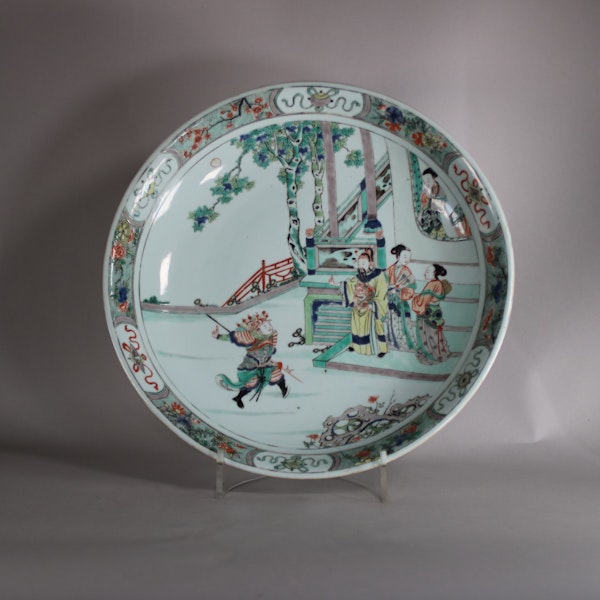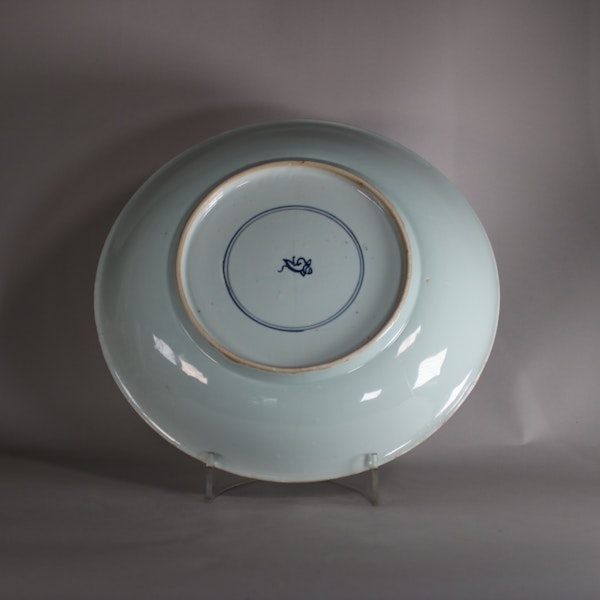Chinese Famille Verte dish, Kangxi (1662-1722)




Chinese Famille Verte dish, Kangxi (1662-1722)
POA
Description
Chinese Famille Verte dish, Kangxi (1662-1722), decorated in bright enamels to the central roundel with a figurative scene depicting the ‘beauty trap’ episode from Chapter 8 of the Romance of the Three Kingdoms, with the warrior Lu Bu wearing full armour and an ornate golden headdress, holding his distinctive crescent-headed polearm (qinglong ji), in a pavilion garden amongst towering fig, blooming dianthus and peony issuing from rockwork, approaching the minister Wang Yun, who is standing on the balcony of his pavilion in long yellow robes and dragon band, with two female attendants, both the minister and the warrior gesturing upwards to where the beautiful Diaochan is visible through an upstairs window; all encircled by a band to the rim with six cartouches containing precious beribboned babao against a green stippled ground with an assortment of floral sprays including prunus, peony, aster and dianthus, enclosed by two further narrow yellow bands.
Diameter: 36cm. (14 1/8in.)
Condition: Repaired
Notes:
The scene depicted on this dish is from the ‘Romance of the Three Kingdoms’ (三國演義), a historical novel attributed to the 14th century writer Luo Guanzhong. While a work of fiction, the novel includes some historical figures, and follows the battles, intrigues and struggles of warring lords during the turbulent hundred year period from the end of the Han dynasty (189-220AD) to the end of the Three Kingdoms period (220-280 AD). The scene relates to an episode in Chapter 8 of the novel, in which the minister Wang Yun sets in motion his plan to thwart the tyrannical warlord Dong Zhuo, who had ousted the rightful emperor and seized control of the kingdom. Wang Yun and his adopted daughter, the beautiful and talented Diaochan, intend to depose the violent pretender by sowing seeds of discord between him and Lu Bu, a heartless mercenary and his adopted son acting as second-in-command. Wang Yun orders a jeweller to make a splendid golden headdress to send to Lu Bu, who, delighted and flattered by the gift, comes to the minister’s peony pavilion to express his gratitude in person. There, in the scene depicted on this dish, he glimpses the beautiful Diaochan, instantly falling under her spell, and into Wang Yun’s trap. After plying the warrior with wine and flattery, Wang Yun offers his adopted daughter up as a handmaiden, a proposal which Lu Bu instantly accepts before withdrawing for the night. Later in the chapter, Wang Yun and Diaochan repeat their scheme, ensnaring Lu Bu’s master, the warlord Dong Zhuo, through similar means at their country residence. Diaochan is once again offered up as a concubine and servant to Dong Zhuo, who, delighted with this offer, immediately sets off with her for the palace, with Wang Yun in attendance. During the journey the entourage is apprehended by Lu Bu, who demands to know why his betrothed is being carried away in this manner. Wang Yun and his daughter continue to deceive both men through various schemes and intrigues, sowing further discord between them which eventually results in the murder of Dong Zhuo by his adopted son.
A later passage offers a few lines written by a ‘scholar of history’ regarding the affair: ‘Just introduce a woman,/ Conspiracies succeed;/ Of soldiers, or their weapons,/ There really is no need./ They fought their bloody battles,/ And doughty deeds were done;/ But in a garden summer house/ The victory was won.’ (Chapter 9, 26, trans. C.H. Brewitt-Taylor).
| item details | |
|---|---|
| Material and Technique | Porcelain with overglaze enamel decoration in the famille verte palette |
| Origin | Chinese |
| Condition | Other |
| Diameter | 36cm. (14 1/8in.) |
Product REF: W814
